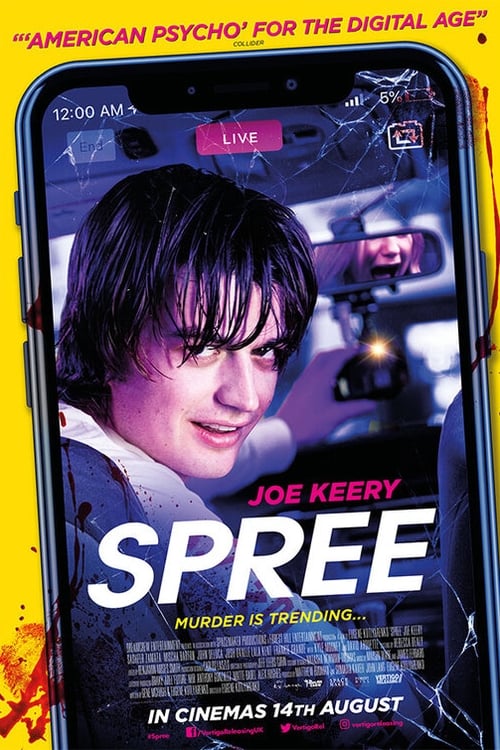Kurt Kunkle, a rideshare driver thirsty for followers, has figured out a deadly plan to go viral. As his disturbing livestream is absurdly embraced by the social media hellscape, a comedienne emerges as the only hope to stop this rampage.
Spree – Film Review
Published August 27, 2023

The film centers around Kurt Kunkle (played by Joe Keery), an aspiring rideshare driver whose real ambition is to become a social media influencer. Kurt’s desperation for online fame drives him to concoct a disturbingly unique plan: he installs a series of cameras in his car to livestream his interactions with unsuspecting passengers, ultimately aiming to create a viral snuff film. The narrative unfolds as a combination of in-car footage, smartphone recordings, and live streams, mimicking the fragmented and chaotic nature of contemporary social media platforms.
Joe Keery delivers an unsettling yet captivating performance as Kurt Kunkle. Keery navigates the character’s descent into madness with a blend of charisma and psychosis, making Kurt both repellent and strangely empathetic. Sasheer Zamata shines as Jessie Adams, a comedian and one of Kurt’s passengers, providing a voice of reason and conscience amidst the chaos. The chemistry between Keery and Zamata is one of the film’s highlights, serving as an anchor in the midst of the film’s frenetic pace.
Kotlyarenko’s directorial choices are audacious and experimental, reflecting the film’s thematic exploration of the absurdities of internet culture. The movie is presented as a patchwork of smartphone screens, security cameras, and live-streamed content, seamlessly blending reality and virtuality. This unique visual style successfully captures the fragmented nature of online interactions, but it may also be disorienting for some viewers, making it difficult to fully engage with the story at times.
Spree excels in dissecting the dark underbelly of social media, highlighting the disconcerting lengths people are willing to go for their ‘fifteen minutes of fame.’ The film cleverly critiques society’s obsession with digital validation, portraying a world where genuine connections are sacrificed for the allure of likes and shares. It raises pertinent questions about the impact of online platforms on mental health, self-worth, and ethical boundaries.
The film maintains a relentless pace from start to finish, mirroring the rapid-fire nature of online content consumption. However, this breakneck speed sometimes detracts from character development and emotional resonance. The tension that emerges from Kurt’s escalating actions is palpable, but the film struggles to sustain it throughout, occasionally sacrificing depth for shock value.
Spree employs dark humor and biting satire to amplify its commentary on internet culture. The film deftly skewers the absurdity of influencer trends, hashtag activism, and performative authenticity. The humor, though effective, occasionally verges on being heavy-handed and may not resonate with all audiences. The film’s satire often serves as a mirror to our own society, forcing viewers to confront uncomfortable truths about their online behaviors.
The film’s visual composition is intentionally erratic, with a plethora of angles, perspectives, and devices used to capture the narrative. While this style enhances the authenticity of the social media experience, it can also create a jarring viewing experience. The editing skillfully weaves together various digital mediums, creating an immersive sense of being entrenched in the social media realm.
As Kurt’s actions escalate, the film raises important ethical dilemmas about the role of digital platforms in promoting and perpetuating dangerous behaviors. It prompts viewers to consider the collective responsibility of society and tech companies in preventing the exploitation of social media for harmful purposes. However, the film stops short of fully delving into these themes, leaving some avenues of exploration unexplored.
Spree, directed by Eugene Kotlyarenko, is a rollercoaster ride through the twisted terrain of online fame and its consequences. With an audacious visual style, dark humor, and thought-provoking commentary, the film navigates the treacherous waters of social media obsession. While it occasionally stumbles due to its breakneck pacing and fragmented storytelling, its message about the perils of seeking validation in a digital world remains impactful. Spree is a cautionary tale that invites viewers to reflect on their own relationship with social media and its potentially devastating effects on human behavior.
